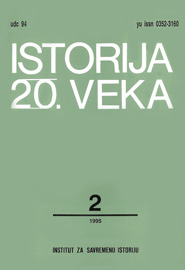SPOLJNI FAKTORI I POLITIČKA KRETANJA U JUGOSLAVIJI 1945-1955.
EXTERNAL FACTORS AND POLITICAL DEVELOPMENTS IN YUGOSLAVIA 1945-1955.
Author(s): Đoko TripkovićSubject(s): Diplomatic history, Political history, Recent History (1900 till today), WW II and following years (1940 - 1949), History of Communism
Published by: Institut za savremenu istoriju, Beograd
Keywords: Yugoslavia; political developments; external factors; postwar period; communists; Soviet Union; foreign policy;
Summary/Abstract: The article deals with the influence of external factors on domestic politics in Yugoslavia between 1945 and 1955. Although Josip Broz Tito and the Communist Party had harnessed the country with a single- -party authoritarian regime, decidedly opposed to foreign involvement in domestic affairs, external influence, exerted primarily by the Soviet Union and the Western powers, was strongly felt in the politics of Yugoslavia. Foreign influence, chiefly motivated by interest in Yugoslavia’s important geo-strategic position, could not be avoided by Tito and his Government without endangering various advantages resulting from relations with these countries, especially in the sphere of economy. The dominant external influence in Yugoslavia, from the end of the Second World War to 1948, was exercised by the Soviet Union. In domestic affairs this was made evident by the Yugoslav Communists’ organization of state and regime according to the Soviet model. Following Tito’s break with Stalin in 1948, the influence of Western powers increased in Yugoslavia, reaching its highest point between 1952 and 1953. The turn towards the West was followed by a certain liberalization of the regime in Yugoslavia, first in economy and then in other spheres of life. The single-party system, however, bore no changes. After! Stalin’s death in 1953, Tito renewed relations with Moscow and the process of liberalization in the country ended. From 1953 to 1955 Tilto, built a neutral position of equal distance towards the blocs as a long term external strategy, while in the country the social and economic system, remaining basically communist, acquired elements of liberalism.
Journal: Istorija 20. veka
- Issue Year: 1995
- Issue No: 2
- Page Range: 77-90
- Page Count: 14
- Language: Serbian

